Yemen’s top AFP surveillance officer on what the indicators tell us
With cVDPV1 and cVDPV2 outbreaks unfolding against the backdrop of a major humanitarian crisis, polio surveillance has never been tougher – or more important
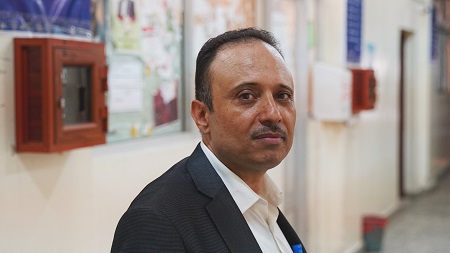 Dr Mutahar Ahmed, national surveillance coordinatorAt his office in Sana’a, Yemen, Dr Mutahar Ahmed stands before a wall-sized map of his country and feels the weight of the world on his shoulders.
Dr Mutahar Ahmed, national surveillance coordinatorAt his office in Sana’a, Yemen, Dr Mutahar Ahmed stands before a wall-sized map of his country and feels the weight of the world on his shoulders.
“The situation here in Yemen is very complex, and the problems we face are quite immense,” said Dr Ahmed.
As Yemen’s national surveillance coordinator, Dr Ahmed leads the country’s acute flaccid paralysis (AFP) surveillance efforts, the primary means of tracking poliovirus transmission. With an explosive outbreak of circulating vaccine-derived poliovirus type 2 having paralysed 115 children and counting, and with swathes of the country’s infrastructure – from roads to hospitals – decimated by conflict, you’d be forgiven for thinking that his and his team’s efforts to surveil for poliovirus were falling short or otherwise compromised. But you’d be wrong.
In Yemen, despite a long-running conflict and complex humanitarian disaster that has significantly impacted health care, AFP surveillance indicators tell a promising story of a functioning system where case detection, sample collection and laboratory analysis – the steps that enable us to detect poliovirus so we can respond to it – are, in fact, on track.
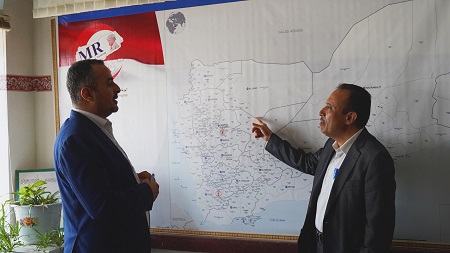 Dr Mutahar Ahmed reviewing the location of AFP cases with Dr Khaled Al-Moayad, Director of Disease Control and Surveillance in Sanaa, YemenSurveillance data allows the polio programme to identify new AFP cases and to test those cases to determine whether polio infection is the cause. In this way, a robust and wide-reaching AFP surveillance system enables health workers to detect the presence and circulation of poliovirus.
Dr Mutahar Ahmed reviewing the location of AFP cases with Dr Khaled Al-Moayad, Director of Disease Control and Surveillance in Sanaa, YemenSurveillance data allows the polio programme to identify new AFP cases and to test those cases to determine whether polio infection is the cause. In this way, a robust and wide-reaching AFP surveillance system enables health workers to detect the presence and circulation of poliovirus.
“In addition to our work building the engagement and knowledge of pediatricians and clinicians, we are reaching the community and community-based health care providers including traditional healers. We also appeal to families for their support in reporting cases. The more aware they are of the symptoms of paralysis in a child, the quicker our surveillance coordinators can collect the stool sample for analysis,” said Dr Ahmed.
Early detection of symptoms such as AFP is a crucial step in the chain of polio surveillance. If a case of paralysis is not reported within the first 14 days of the onset of symptoms, the reliability of testing the sample in the laboratory reduces significantly. In Yemen, the AFP surveillance system in high-risk districts is supported by volunteers trained in community-based surveillance. In 2021, 82% of AFP cases were detected early, within the first seven days of the onset of paralysis, which is above the global target of 80%.
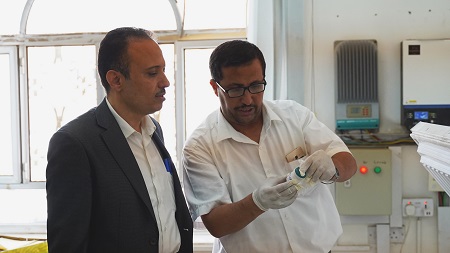 Dr Mutahar Ahmed L inspecting samples with Dr Abdullah Yahya, assistant national coordinator for AFP surveillance
Dr Mutahar Ahmed L inspecting samples with Dr Abdullah Yahya, assistant national coordinator for AFP surveillance
Once a case is detected and stool samples are collected, it’s vital to make sure the samples reach the laboratory in good condition.
“Two stool samples are required from each child showing symptoms of paralysis. Both samples need to be collected within the first 14 days, 24 hours apart. They need to be correctly labelled, and their temperature needs to be maintained at between 2 and 8 degrees. Otherwise, they are not adequate samples,” said Dr Ahmed.
In 2021, 921 AFP cases were detected. Of these cases, 87.84% had adequate specimens collected, which is above the global target of 80% (Polio bulletin, issue no. 1227, week 14).
Along with stool adequacy, another key performance indicator for surveillance is the non-polio AFP rate. This refers to the detection of diseases, other than polio, that can cause AFP. Yemen’s non-polio AFP rate is 5.96 per 100 000 children aged below 15 years in 2021, significantly higher than the global standard of 3 per 100 000 for polio outbreak countries like Yemen (Polio bulletin, issue no. 1227, week 14). This accomplishment points to the sensitivity of Yemen’s surveillance system due to the relentless efforts and commitment of the surveillance personnel working with Dr Ahmed.
Due to electricity shortages, maintaining the cold chain (keeping vaccines cold) and reverse cold chain (keeping stool samples cold) poses a significant challenge for the programme. To overcome this and further increase the efficiency and sensitivity of the surveillance system to detect polioviruses as quickly as possible, solar power panels have been installed in health facilities at the central and governorate levels to support the storage and transfer of stool samples. One indicator of the impact of this change is Yemen's non-polio enterovirus rate, which tells us what percent of stool samples tested negative for poliovirus, but were in such condition that they could still test positive for enteroviruses. In 2021, that rate was 20% above the global target of 10%.
Because Yemen does not have a poliovirus laboratory in-country for testing, samples are first collected at the central level in Sana’a and then sent by road to Muscat, Oman. The journey can take up to 7 days, barring any obstacles or emergencies.
“Working in this role is a challenge, but what I particularly enjoy is how we are able to turn these challenges into opportunities for the AFP surveillance programme. The AFP indicators for the last year show us how far we have come in our journey,” said Dr Ahmed.
He explained why these indicators are so critical to the polio programme.
“The fact that our indicators are above the minimum global standards shows that the surveillance system is functioning, sensitive and responsive, despite the critical humanitarian situation. The data from our surveillance work has helped us identify the outbreak of circulating vaccine-derived polioviruses type-1 and type-2. The situation is quite fragile, but we are committed to addressing these challenges, and we will continue to do so.”
WHO has supported Yemen to establish an environmental surveillance system to supplement its AFP surveillance system and support early detection of polioviruses and more timely responses.
Building a specialized cadre of doctors and nurses to save lives in Yemen
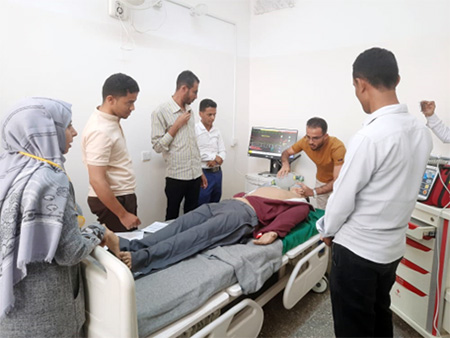 Aden, 22 June 2022 – Providing critical care in Yemen is a challenging task. Doctors and nurses with the skills and knowledge needed to save lives are often pulled to the private sector and abroad because of better salaries and working conditions.
Aden, 22 June 2022 – Providing critical care in Yemen is a challenging task. Doctors and nurses with the skills and knowledge needed to save lives are often pulled to the private sector and abroad because of better salaries and working conditions.
During the COVID-19 pandemic, short-term intensive care and critical care trainings have filled an important gap in strengthening case management capacities. The WHO Representative to Yemen, Dr Adham Rashad Ismail Abdel Moneim explains “with support from partners, including the World Bank, WHO and the Ministry of Public Health and Population (MoPHP) trained more than 2000 health workers in case management. These short-term trainings were designed based on needs and country capacities”.
Now, WHO and MoPHP are looking towards a future beyond the COVID-19 pandemic, and towards lasting improvements in critical care capacities. With the World Bank’s support via the Yemen COVID-19 Response Project (YCRP), a longer-term training is being rolled out to quickly build a cadre of competent nurses and physicians working in government hospital intensive care units (ICUs) in Yemen. This training will contribute to ensuring the health system is equipped with sufficient critical care capacity for future emergencies.
After consultation with the MoPHP, University of Aden Faculty of Nursing and Medicine, and senior health professionals, a curriculum for a certificate course in critical care was developed. The 9-week course includes didactic, university-based laboratory simulations and practical clinical attachments in ICUs, delivered in partnership with Oman Medical Specialty Board. Course modules are being delivered in a variety of locations: theory at conference venues in Aden, laboratory simulations at the University of Aden Faculty of Medicine & Nursing Skills Laboratory, and practical classes in ICUs in government and private hospitals in Aden. The course also incorporates online training by WHO and the European Society of Intensive Care Medicine.
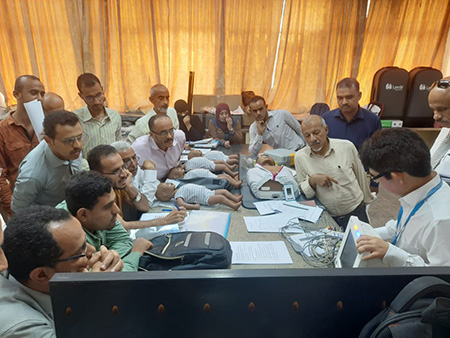 Participants who pass the course will receive a certificate in the Fundamentals of Critical Care Support (FCCS) from the Faculty of Medicine at the University of Aden. To ensure a return on investment, participants will be bonded to work in public sector hospitals for two years.
Participants who pass the course will receive a certificate in the Fundamentals of Critical Care Support (FCCS) from the Faculty of Medicine at the University of Aden. To ensure a return on investment, participants will be bonded to work in public sector hospitals for two years.
Forty-eight health workers are taking part in the inaugural course – 24 physicians and 24 nurses from all southern governorates in Yemen. They were selected via a competitive process, including an interview and written test, and all the participants are currently working in government hospital ICUs.
Implementation of this course is possible because of strong teamwork and close collaboration with the University of Aden, MoPHP, numerous hospitals in Aden, the World Bank and WHO. In the rollout, work is ongoing with the authorities to improve the didactic, simulation, and clinical sessions to enhance the experience for the students.
By contributing towards producing a cadre of critical care experts, this course is part of bridging the humanitarian-development nexus. It is both enhancing emergency preparedness and response capacities in Yemen, as well as strengthening critical care capacities within the heath system.
WHO project to boost COVID-19 vaccination coverage in Yemen
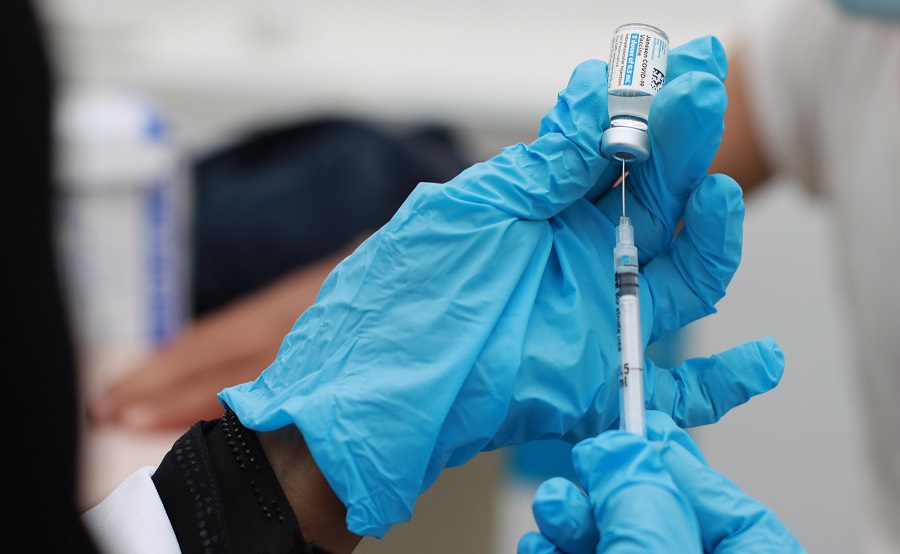
31 May 2022 – WHO has started a 6-month, US$ 2.8 million project to increase COVID-19 vaccination coverage to 10% in 13 governorates and 133 districts of southern Yemen.
In partnership with the King Salman Humanitarian Aid and Relief Centre (KSrelief), WHO is securing and distributing new vaccines and supplies to districts and facilities, coupled with training and deployment of COVID-19 vaccination teams to vaccination sites in these governorates and districts.
Major hospitals and health centres are serving as fixed vaccination sites, with smaller facilities in selected communities serving as temporary sites. In addition, populations in hard-to-reach areas are being reached by outreach/mobile teams.
WHO is monitoring storage and temperature control at vaccine cold storage and service delivery points. Priority interventions are adhering to all WHO standard guidelines for COVAX planning and training of health workers on how to administer the COVID-19 vaccines and engage with communities.
A minimum vaccination coverage of 70% of Yemeni adults is required to achieve adequate country-wide protection against COVID-19 infections and deaths. To date, a total of 886 664 persons above 18 years have been fully vaccinated up to 12 May 2022 with either one dose of the Janssen vaccine (572 495), 2 doses of AstraZeneca vaccine (312 025), or 2 doses of Sinovac (144).
Working jointly with UNICEF in Yemen, WHO is updating cold chain and vaccine management tools as per global standards and national requirements. Centralized supervision and third-party monitors are ensuring proper warehousing and temperature monitoring of the vaccines at all storage and service delivery points. WHO is also continually assessing the adequacy of cold chain capacity to accommodate vaccine volumes and resolve arising challenges.
Project funding of US$ 2.8 million is covering all activities with the exception of vaccine procurement, personal protective equipment, infection prevention and control materials, safety boxes, syringes and containers for safe waste collection at facilities administering the vaccines.
“The Yemeni people have battled 4 waves of COVID-19, and Yemen’s fragile health care system has been unable to cope,” said Dr Adham Rashad Ismail Abdel-Moneim, WHO Representative to Yemen. “WHO is grateful to KSrelief for partnering with us in this important campaign, as we continue to fight this pandemic together with the Ministry of Public Health and Population and all of our partners in Yemen.”
Sustaining and strengthening Yemen’s health care system for COVID-19 response and delivery of other essential and life-saving services
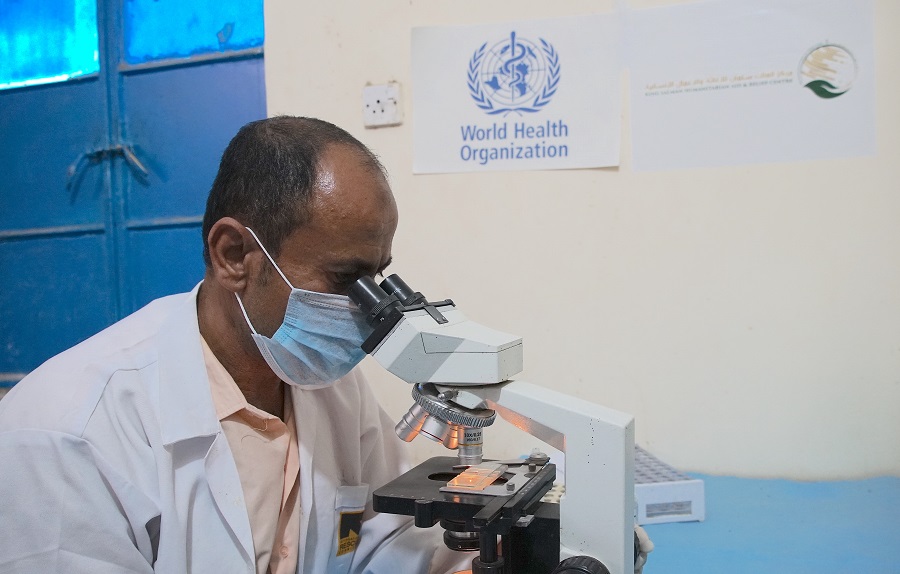
31 May 2022 – The World Health Organization (WHO) is partnering with the King Salman Humanitarian Aid and Relief Centre (KSrelief) to sustain the COVID-19 response and essential services at targeted health care facilities, combined with community-based interventions.
These focused and extensive health interventions will be carried out by WHO in Yemen over the next 10 months, with US$ 10.86 million in total project funding from KSrelief. Interventions are being guided by vulnerability assessessments of exacerbating factors such as morbidity, environmental hazards and social determinants of health. The interventions will follow 2 reinforcing tracks of action:
Providing equipment, medicines and materials worth US$ 6.23 million to limit transmission of the COVID-19 response in Yemen and help health authorities to reduce the number of cases referred to health facilities; and
Providing equipment and medicines worth US$ 2.17 million to sustain and improve the quality of essential services of health facilities and laboratories in priority districts of Yemen.
Project interventions focus on sustaining the COVID-19 response in Yemen to limit transmission of the virus and help health authorities reduce cases referred to health facilities. This grant will build on existing actions and services currently being undertaken to improve the COVID-19 response and expand programme delivery. These interventions should directly or indirectly benefit some 4.5 million of 7.3 million people who are targeted by Yemen's Humanitarian Response Plan.
Project interventions to sustain essential health services will focus partially on strengthening epidemiological and laboratory surveillance to reduce the prevalence of outbreaks. The needed equipment, supplies and medicines will also be procured for essential health services spanning treatment of noncommunicable diseases, general care, child health, reproductive and maternal health, dialysis, and other services. These interventions should directly or indirectly benefit some 2.5 million people. Interventions will aim to improve prevention, response and referral capacities of primary and secondary health care facilities that are overwhelmed with patients requiring critical care. Community-based interventions will also be expanded to reduce these pressures on health care facilities across Yemen.
All project activities will be implemented in close coordination with the Ministry of Public Health in Sana’a and Aden. WHO will ensure their sustainability through coordination mechanisms and capacity-building with national public and civil society organizations. WHO Yemen will work closely with all stakeholders and partners to design specific interventions and monitor pre-determined indicators.
Senior staff and management at the WHO country office and the regional and headquarters level will also work with senior officials of the Ministry to ensure that resources are utilized appropriately and that lessons learned are shared with stakeholders and partners.
“The provision of essential services at health care facilities across Yemen remains very challenging, as the majority of Yemen’s 30.7 million people are in need of of these services,” said Dr Adham Dr Adham Rashad Ismail Abdel-Moneim, WHO Representative to Yemen. “These interventions to be carried out by WHO, in partnership with KSrelief, over the next 10 months will be of critical benefit to millions of people across Yemen, even as only about half the country’s health facilities are fully functioning at present.”








